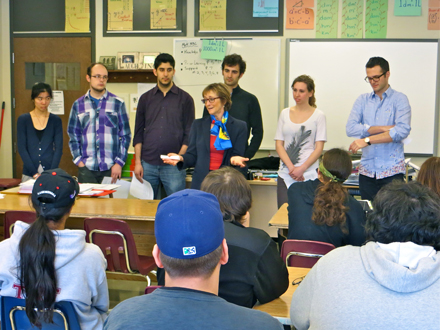
High School Outreach Program reaches more than 200 students from disadvantaged communities
By Neale McDevitt
On April 3, a group of high school students from some of Montreal’s socioeconomically disadvantaged communities filed into the Palais de Justice to stand before a judge. It was a scene that could have invited people to jump to erroneous conclusions.
Instead of handing down a verdict, however, Justice Legault imparted his knowledge and experience to the youths, speaking to them at great length about his responsibilities as a Quebec Superior Court judge.
“These kinds of interactions are so important to these students because for many of them their only dealings with the law have usually been negative, because a friend, neighbor or family member has been arrested or is in jail,” says Ali Olshefsky. “We want to demystify the legal system and show these kids that they can study and practice law if they want.”
‘We’ are the more than 50 members of Faculty of Law’s High School Outreach Program (HSOP), a student-run initiative that has been breaking down walls since 2006.
The goals of HSOP are to foster in young people a curiosity about the law and an understanding of the relevance of it in day-to-day life; to develop mentorship relationships between high school students and law students; to introduce high school students to basic concepts of law such as rights and obligations; and to provide information about university studies. The program targets students who are living in difficult socio-economic situations.
“Quebec already has some of the highest dropout rates in the country,” says Olshefsky, “but in the communities where we work, those rates can be anywhere between 25 and 80 per cent. So the point of the program is to get kids interested in not just legal studies but post secondary education in general.
“Not only are we concerned with Quebec’s alarming high school dropout rates, but we also want to address the fact that many underprivileged kids, as well as children of immigrants and visible minorities in Montreal, are under-represented in post-secondary and legal education,” continues Olshefsky.
Sponsored by the Beaverbrook Foundation, HSOP partnered with six high schools this year; the Kahnawake Survival School in the Mohawk territory of Kahnawake; James Lyng High School in Little Burgundy; LaSalle Community Comprehensive High School in LaSalle; École secondaire Pierre-Dupuy in Hochelaga-Maisonneuve; École secondaire Chomedey-De Maisonneuve in Montreal; and Beurling Academy in Verdun.
The McGill volunteers – all students from the Faculty of Law – are paired with a high school where they conduct between four and six legal training workshops a year. These workshops focus on everything from charter rights to criminal law to how law has had to adapt because of Facebook, cell phone usage and advances in technology. The workshops are designed to be as interactive as possible, with brief introductory lectures on a topic of five minutes before the class is broken into smaller groups to continue the discussion.
For the past two years, Olshefsky has worked with Kahnawake Survival School. During one workshop this year, the class compared traditional Canadian criminal law to traditional indigenous systems, in particular sentencing circles, an alternative form of dispute resolution in which members of the community, including the victim and the offender, work together to come up with the most appropriate sanction.
“It was really interesting because (recently retired) Supreme Court Justice Marie Deschamps participated in this workshop,” says Olshefsky. “Obviously, she was able to very well represent the Canadian conceptualization and she and the kids talked about what they thought would be the fair and just for this mock scenario.”
This year’s HSOP program culminated with an open house at the Faculty of Law for the more than 200 students who participated in the program. As well as tours of the Faculty and McGill’s downtown campus, the students participated in a final workshop in the Moot Court. Smaller groups were brought to the Palais de Justice where they met a judge and a defense lawyer and sat in on trials and bail hearings. “A lot of the kids were excited because they could follow but was going on because of what they had learned in their workshops,” Olshefsky says.
While it is impossible to put exact numbers on a program like HSOP, there are a number of success stories. “The exciting thing is that two students who came through our program are now doing Police Tech at John Abbott,” says Olschefsky. “We’re starting to see the fruits of our labour.
“Legal education isn’t only for people from a certain background. If we can help open the study of law to people from different backgrounds then, eventually, you will have a more just legal system and one that is more reflective of the entire population.”
